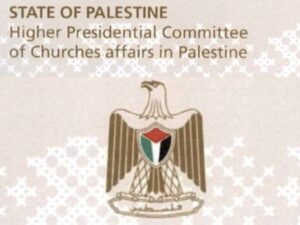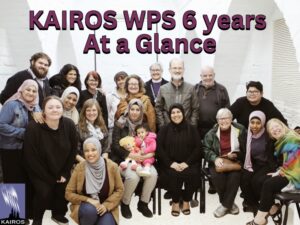One Day: Three stories of resilience and self-determination
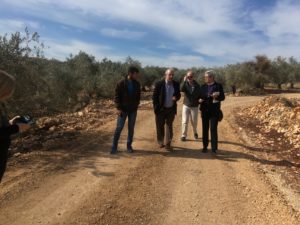
By Susan Johnson
Story #1 from Qalqilya
Our day started on the bus, again, but we travelled with Ramzi Zananari from International Christian Community, a founder of the Department of Services to Palestinian Refugees (DSPR). As we drove, Ramzi described the two biggest challenges facing Palestinians –access to land and water. Northern Palestine has the best agricultural areas, but now the Israelis have annexed 60% of the Jordan Valley. Agriculture used to be 22% of the GDP for Palestinians but is now down to only 4% due to the land grabs and control of water resources.
DSPR is trying to encourage farmers to stay put and avoid the confiscation of their lands. But accessibility to their lands has become a major issue. With the increased number of Israeli settlements on confiscated Palestinian lands, the government of Israel has created a network of bypass roads, each with a buffer zone of 75m on either side. This has led to the reality that many Palestinian farmers are cut off from access to their land. A total of 9% of the West Bank is taken up with Bypass Roads.
There are now 500,000 Israeli settlers living in the West Bank. Some are there for reasons of belief (they believe Israel should possess all the land) and some are there for economic reasons (it is much cheaper to live in a settlement than in Israel).
Ramzi took us to Qalqilya, to see a project that has built a new road to allow Palestinian farmers access to their agricultural land. It is 3500 meters long and 6m wide. It allows 89 farmers access to about 45 hectares of land where mostly olive trees grow, many of which are over 150 years old.
There is a secondary project associated with the road, the building of a water reservoir and a water pipeline that follows the side of the new road. With access to a new source of water, there are plans to plant guava, fig and almond trees, all of which will yield a higher dollar value for their crop, enabling farmers to make a living wage and encouraging them to stay on their land.
Although there is artisanal water lying only 50-100 meters under ground, it is under the control of the Israeli “Civil Administration” operated by the military. And it is impossible for Palestinians to get permits to drill boreholes. In direct contrast, settlers have access to this same water and we heard that Israel is set to become a water exporter in 2020. This is why the creation of water reservoirs to catch rainfall has become so important for the security of Palestinian farmers.
Story #2 from Augusta Victoria Hospital
We had the opportunity to visit Augusta Victoria Hospital (AVH), a specialized hospital run by the Lutheran World Federation. It provides most of the specialized care for Palestinians including cancer treatment, kidney dialysis and palliative care for adults and paediatrics. It provides hematology, oncology, and bone marrow transplant and has both outpatients and daycare as well as critical care with departments for Radiology, Clinical Laboratory and Community Services which offer mobile clinics for diabetes and mammography.
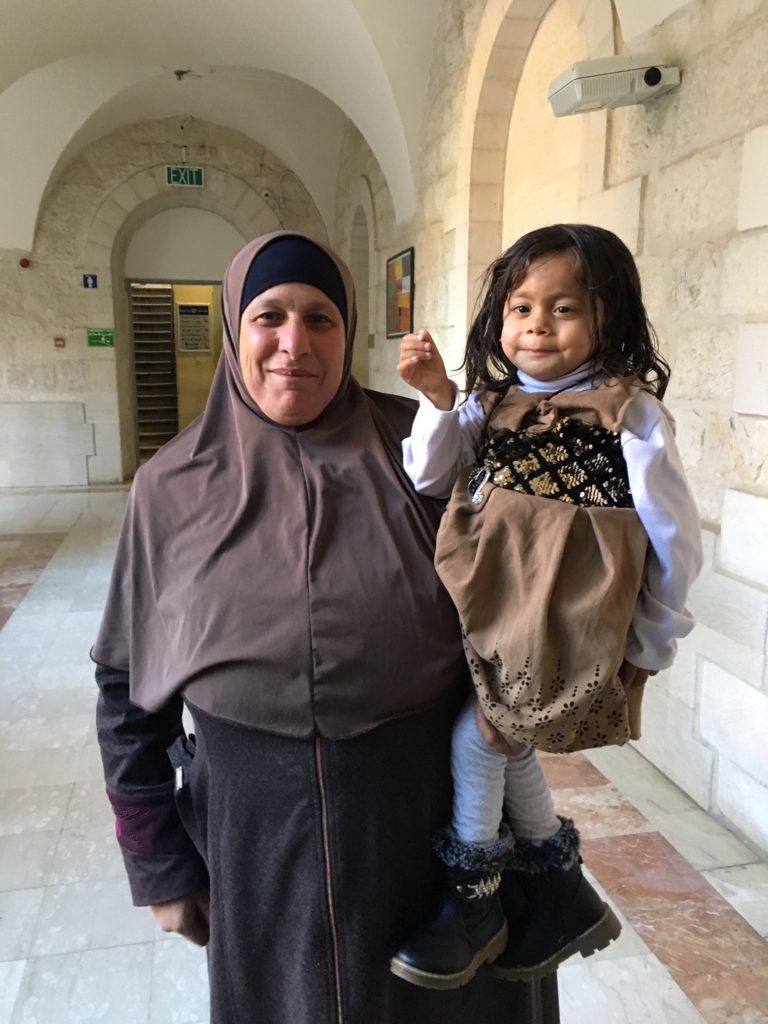
Maha Taraya, chief nursing officer, introduced us to the hospital and gave us a tour. She explained the vision of the hospital as: People united in diversity, living in a just society with dignity and peace, where they can claim their universal rights, achieve their full potential and meet their basic needs in order to improve quality of life individually and collectively.
Since the hospital serves patients from both the West Bank and Gaza, they have to work hard to get permits for people to travel to their location in East Jerusalem. They provide special buses to pick and return patients for day procedures. They hire hotels for Gaza patients during their oncology and radiation treatments so that they do not need to keep crossing the borders.
Some of the most exciting work they do is with their mobile diabetes and mammography clinics. Both diabetes and breast cancer have a high incidence among Palestinians. The mobile clinics that are able to go into remote locations have made a big impact in the communities affected by these diseases and mortality rates have significantly decreased.
The highlight of our visit was at the point where we were just about to leave. We ran into 6 year old Halah and her mother, who we had met in Thabra just two days earlier. They were at AVH for Halah’s dialysis treatment. What a joy to see the smile on both their faces and to make a personal connection to the work of this very important hospital!
Story #3 from Neuamah/Jordan Valley
The end of a very long day found us in Jericho, meeting and eating with a women’s cooperative that run a restaurant. We heard many stories of the difficulties these women face in the depressed economy of the region (remember all that agricultural land that has been confiscated). Many of the women have had to provide for their families by working on Israeli settlements where they face many challenges: having to travel very early in the morning on over-crowded buses where they experience harassment, leaving their children alone to get up and get to school which leads to many children dropping out or engaging in troublesome behaviour, and general mistreatment in the workplace including not being allowed to use their phones to monitor their children.
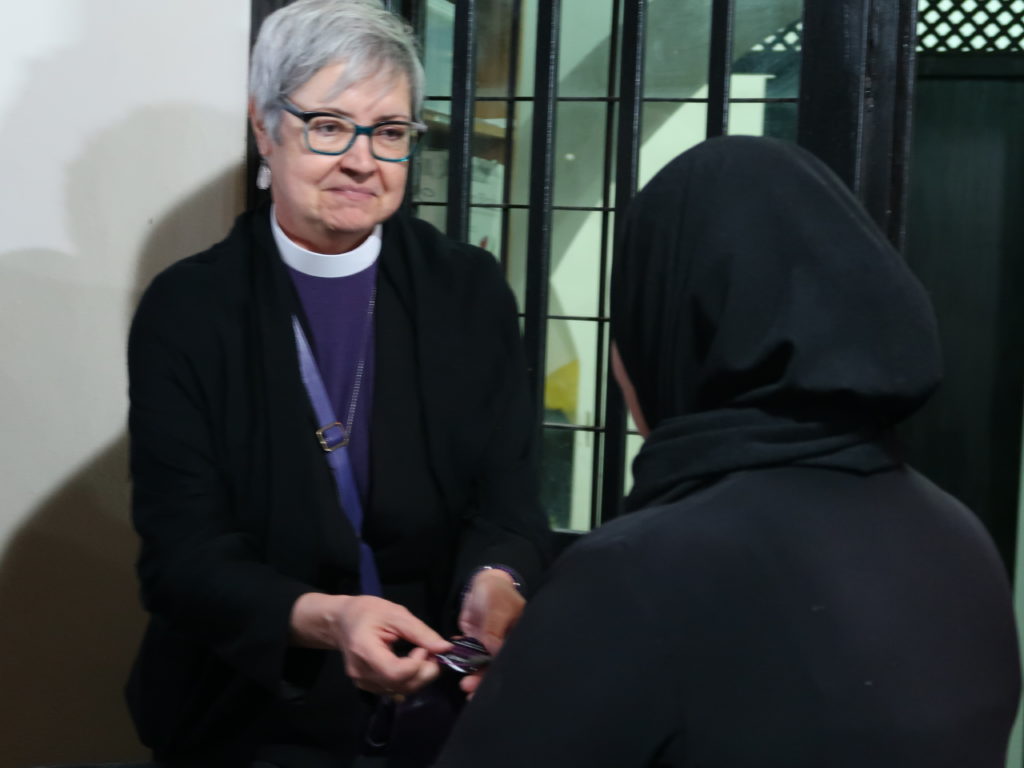
They expressed a desire for economic empowerment and dream of more cooperatives where Palestinian women can find employment away from the settlements. They gather together to learn more about their rights, to support each other, to work with women who have experienced violence. For me on of the most poignant moments of the evening came when one of the women spoke these words:
“When it comes to violence, we suffer every form of violence. When we walk in the streets, we feel insecure. The very air we breathe is under the control of Israel – we are choked. Nothing is under our control – water, land or the environment. I am a peace-loving woman, but we are living with oppression. They are enjoying our blessings, our lives. I want to enjoy our blessings as well. I want to enjoy my justice, but I don’t know how to get my justice. I want to go to the sea and swim.”
What incredible, resilient and steadfast women they are!

